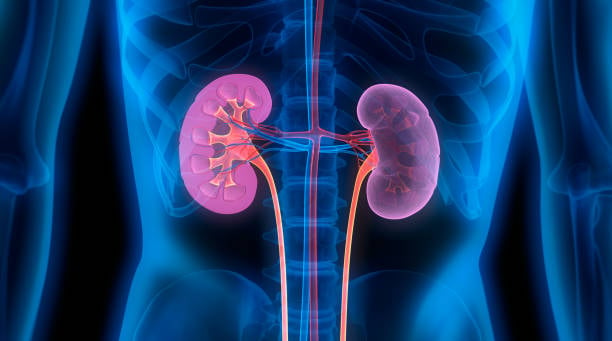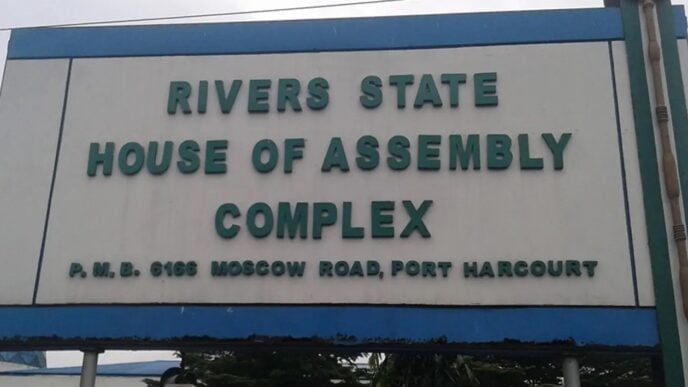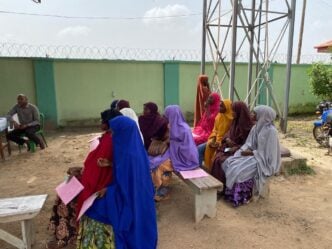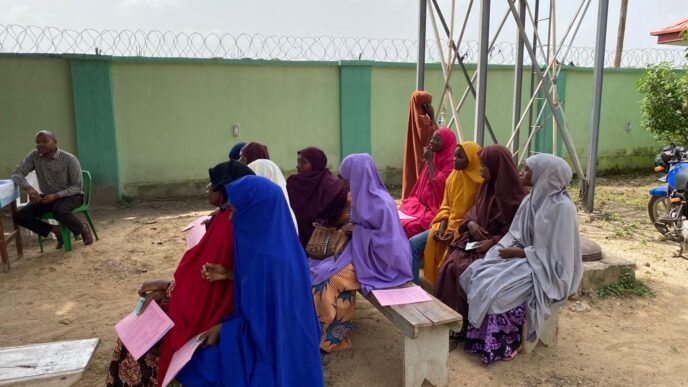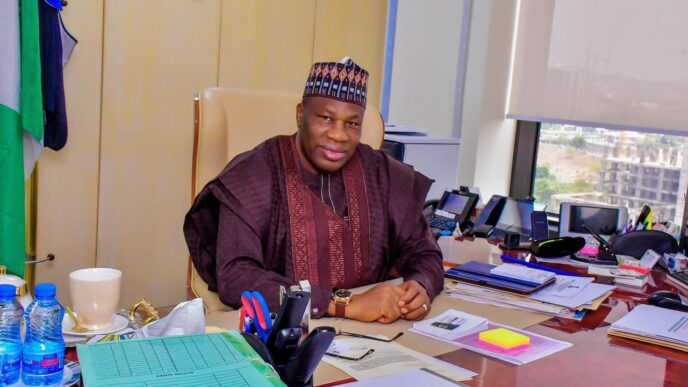3D illustration of human kidneys with cross-section
BY SYLVESTER OJENAGBON
Chronic kidney disease is a significant public health concern in Nigeria. Studies show its prevalence is high, with some reports suggesting that up to 26% of individuals in some regions of the country may have it. This is further reinforced by the fact that end-stage renal disease, commonly referred to as kidney failure, accounts for a substantial portion of hospital and renal admissions in Nigeria.
Now, the kidneys are the bean-shaped organs in the body that play a vital role in filtering blood and removing waste. They are reddish-brown and are located in the posterior abdomen, one on each side of the spine, just below the rib cage. Each kidney is about the size of a fist. Healthy kidneys filter about half a cup of blood every minute, removing waste products, which are then excreted as urine.
The kidneys also regulate the amount of water and electrolytes in the body and ensure proper hydration and mineral balance. They equally produce hormones like erythropoietin (which stimulates red blood cell production), renin (which helps regulate blood pressure), and calcitriol (the active form of vitamin D). The kidneys similarly help maintain the body’s ph balance by regulating the amount of acid and bicarbonate in the blood.
Advertisement
So, what is chronic kidney disease? It is a condition where the kidneys are damaged and are characterised by a progressive loss of kidney function over several months or years.
End-stage renal disease, or kidney failure, signifies the final stage of chronic kidney disease, where the kidneys are permanently damaged and unable to filter blood as they should. Sadly, this condition can only be managed through either dialysis (removing waste and excess fluid from the blood through a machine) or a kidney transplant (replacing the failing kidneys with healthy ones). Without dialysis or a transplant, people with kidney failure cannot survive for long due to the accumulation of waste and fluids.
Chronic kidney disease is primarily caused by diabetes and high blood pressure. Other factors include heart disease, obesity, smoking, family history, and certain genetic conditions like polycystic kidney disease. The indiscriminate use of painkillers, particularly non-steroidal anti-inflammatory drugs, and the consumption of certain herbal concoctions have also been found to be significant factors in the development and progression of chronic kidney disease.
Advertisement
Dehydration, especially if it is frequent or severe, can equally damage the kidneys and make them less efficient at filtering waste from the blood. That is because when one is dehydrated, the blood volume decreases, leading to less blood flow to the kidneys. This can strain the kidneys and impair their ability to function properly. Dehydration can also lead to the formation of kidney stones, which can block the urinary tract and damage the kidneys.
When it comes to managing chronic kidney disease, part of the problem in Nigeria is that many people are not diagnosed until the disease is well advanced. This leads to a higher risk of developing kidney failure. The challenges with accessing affordable and quality healthcare services, including renal replacement therapy, further compound the problem.
Inadequate public awareness about chronic kidney disease and its risk factors also hinders prevention and early detection efforts.
The truth is that managing kidney failure in Nigeria, as anywhere else, is very expensive, particularly with haemodialysis and kidney transplants. As of 2023, it was estimated that a single dialysis session could cost anywhere between ₦30,000 and ₦100,000 or more, depending on the location, type of facility, and patient’s specific medical needs. This translated to a monthly cost of approximately ₦360,000 – ₦1.5 million for three sessions per week.
Advertisement
The cost of a kidney transplant that same year varied from ₦3.5 million (at a government facility) to anything between ₦8 and ₦12 million in private hospitals in Lagos and Abuja. Recent figures, however, put it at between ₦25 million and ₦30 million, depending on the hospital, surgeon’s experience and post-transplant care requirements. That is quite cheap when compared to costs in the United States of America, Dubai or India, which can be as high as $25,000 – $150,000.
The cost of medications, blood transfusions, and other related expenses often further increases the total cost of treatment. Worse, the number of dialysis machines and transplant centres in Nigeria is grossly inadequate.
Thankfully, the federal government recently approved an 80% subsidy on kidney dialysis, reducing the cost from ₦50,000 to ₦12,000 per session. This is aimed at easing the financial burden on patients and will be implemented in federal medical institutions across the country’s six geopolitical zones. But much more needs to be done!
Now, as much as the government has a major role to play, the responsibility of maintaining kidney health starts with every individual. We all must embrace lifestyle modifications, including a balanced diet, regular exercise, staying hydrated, quitting smoking, and managing chronic conditions like diabetes and high blood pressure. We also need to go for regular check-ups and monitor kidney function through tests that can also help detect early signs of problems.
Advertisement
On the part of the government and other stakeholders in the health sector, expanding screening programmes to identify persons at risk for chronic kidney disease and facilitating timely diagnosis will go a long way in stemming the tide of chronic kidney disease.
In addition, access to affordable and quality healthcare services, including renal replacement therapy, for people with chronic kidney disease should be improved.
Advertisement
There is also an urgent need to increase public awareness about chronic kidney disease and its risk factors to promote early detection and prevention.
In the end, it is much better to prevent chronic kidney disease than seek a cure. And the power to prevent it rests mainly in our awareness and actions. We should not wait for symptoms to appear before we go for screening or start taking preventive measures. We must start doing the needful now!
Advertisement
Ojenagbon, a health communication expert, lives in Lagos.
Advertisement
Views expressed by contributors are strictly personal and not of TheCable.
